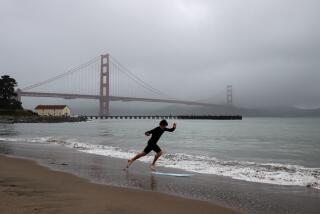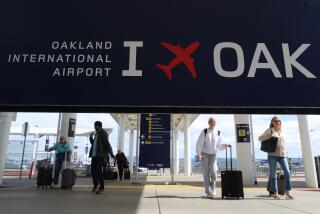Ruling Due on Burbank’s Power to Veto Airport Plan
- Share via
BURBANK — In the second of a two-part decision, a judge is scheduled to rule today whether city officials can veto the proposed expansion of Burbank Airport.
Los Angeles Superior Court Judge Carl J. West stung the airport growth proponents in October by ruling federal law did not prevent Burbank from blocking purchase of a 130-acre parcel to build a proposed 19-gate terminal building.
Now, West will decide whether Burbank relinquished the power to stop airport expansion when the city signed a joint powers agreement to run the facility with Glendale and Pasadena.
At stake is expansion of the airport, through which 5 million travelers pass each year. The agency that runs the airport wants to build a newer, larger terminal, but city officials are opposed to pollution and traffic they fear the new building would bring.
In a related issue, West is expected to consider whether the Burbank City Council’s opposition to the airport plan showed bias.
Airport lawyers allege the City Council “displayed deep, personal animosity toward the authority . . . publicly referring to its members as ‘scumbags,’ ‘thieves’ and ‘scoundrels.’ ” Councilman Ted McConkey, according to court documents, described pro-expansion forces as “willing to eat their own babies.”
Both sides agree a Burbank victory would give the city more leverage in future development proposals and could dash the airport’s plans for terminal expansion.
“If we win, and I think we will, it makes very unlikely that the airport will build a new terminal in the foreseeable future,” said McConkey. “It would also put us in a position where we can resolve the issues to our satisfaction.”
Airport Authority spokesman Victor Gill agreed a loss could cast doubt on their expansion plan. “It means that Burbank will get the veto over whether the airport can buy land for a new terminal,” said airport spokesman Victor Gill.
The parties agree the judge has worked hard to encourage a resolution of the case through face-to-face negotiations. But those efforts may not be enough given the complexity--and emotion--of the legal dispute stretching back decades and including a 1973 U.S. Supreme Court case.
In the precedent-setting high court ruling over noise, Burbank effectively was barred from interfering in airport safety and operations, attorneys from both sides said.
But recently Burbank gained leverage over the airport by invoking the state Public Utilities Code, which grants California cities authority over the airport expansion within their boundaries.
The bone of contention in the most recent case dates to 1980, when the Federal Aviation Administration warned airport officials the existing terminal violated government design standards because it was too close to the runway, but did not require that the terminal be relocated.
Citing the FAA standards, the authority proposed moving the facility to another location.
At the same time they voted in 1993 on a plan to expand the terminal building and increase parking by 1,700 spaces in a two-phase construction project.
The airport went forward with plans to acquire the Lockheed property three years later. Burbank officials then voted the deal down, setting up the confrontation in court.
Left to be decided, however, is what Burbank gave up, if anything, by agreeing to become part of the tri-city Airport Authority. Burbank lawyers called the notion that they would give up power to an entity they helped create a “Frankenstein theory.”
“Until the present dispute, the Airport Authority regularly sought various approvals from the city for airport construction projects,” city lawyers argued.
There is “nothing,” they added, that “implies that Burbank, Pasadena or Glendale have delegated their land use or other governmental functions to the authority.”
The Airport Authority contends that Burbank signed away any oversight authority they had under state law by amending the airport’s Joint Powers Act in 1991.
“Burbank’s attempt to invoke [state law] is simply an attempt to recapture control over the airport, control it relinquished to ensure the continued operation of the airport,” airport lawyers alleged.
No matter what the outcome of the court case, the biggest sticking point will remain: noise.
In discussions, Burbank has offered to accept a limited expansion in return for an enforceable curfew on airline flights after 10 p.m. and before 7 a.m. Currently, the airport has a voluntary curfew in place.
More to Read
Sign up for Essential California
The most important California stories and recommendations in your inbox every morning.
You may occasionally receive promotional content from the Los Angeles Times.













